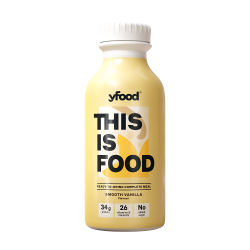Are meal-replacement drinks a fad or the future of convenience food?

Meal-replacement drinks were first created in the 1960s, with products like Metrecal, a low-calorie drink containing protein, carbohydrates, fats, vitamins and minerals designed for hospital patients who were unable to consume solid foods. But the concept of meal-replacement drinks only really entered the public consciousness in the 1970s, when American businessman Daniel Abraham founded the weight-loss brand SlimFast, taking the idea of replacing a traditional meal with a drink into the mainstream. Sales skyrocketed through the 1980s and into the 90s making SlimFast a brand which is internationally recognised and sold in countries across the globe.
However, it’s only in recent years that the notion of meal-replacement drinks has broken out of the weight-loss sphere and into popular culture as a lifestyle choice. So what's sparked this culinary shift and will it last?
Time flies in the twenty first century
People are choosing meal-replacement drinks in increasing numbers and many have cited time-saving as the reason for this.

"We see that more and more people have a busy lifestyle, but they do not want to sacrifice nutrition for that. Previously, they may have skipped a meal or grabbed something less nutritionally optimal. In these situations, they can now grab a nutritionally complete drink,” Paul Sloane, UK and Ireland country manager of yfood told FoodNavigator.
Luca Bucchini, chair of the European Specialist Sports Nutrition Alliance (ESSNA) agrees, “In today's fast-paced world, active consumers sometimes find it challenging to prepare and consume traditional meals to meet their nutritional needs. Meal-replacement drinks offer a quick and convenient alternative that fits into busy lifestyles.”
And meal-replacement drinks don't just save time in the avoidance of food preparation and consumption time, they also offer convenience and time-saving in the way we purchase them.
“The growth of e-commerce and online retailing has also been driving the expansion of the market, making meal-replacement drinks easily accessible to consumers worldwide,” adds Bucchini.
Not just a milkshake but a complete meal
Some have written meal-replacement drinks off as a fad, claiming they offer little nutritional value, but the recent increase in investment by manufacturers in the industry has led to a marked improvement in the nutritional quality of these products, with a focus on providing essential nutrients for healthy development.
“Being convenient, readily available and formulated to provide a balanced mix of essential nutrients, these products appeal to individuals looking for an easy way to ensure they are meeting their nutritional needs, including for gaining mass. Meal-replacement shakes provide nutrients, including proteins, carbohydrates, fats, vitamins, and minerals,” says Bucchini.
The continued growth of the industry will likely lead to continued research and development, which will, in turn, be the strongest drivers behind the industry’s future growth.

Tipping the scales
Though many are switching to the newer form of “liquid diet” to save time, it’s also undeniably true that many see meal-replacement drinks as an aid to weight-loss.
“The trend towards meal-replacement beverages started and has been driven by multiple factors, including convenience and the benefits these products can provide to sportspeople, such as nutritional balance and weight management,” explains Bucchini. “By catering to consumers seeking convenient and nutritionally complete products for weight management or to enhance their fitness and elevate their state of wellness, the global meal-replacement shakes market is growing. Some sportspeople use meal-replacement drinks as part of a weight management strategy. Meal-replacement drinks often provide portion control and a predetermined calorie count, making it easier for active consumers to monitor and control their caloric intake.”
In addition to this, governments across Europe have been working to address the growing problem of obesity amongst European citizens.
“Over the last few years, we’ve seen an increasing interest from policy makers in reducing obesity levels in Europe,” explains Professor Anthony Leeds, chair of TDMR Europe, the trade body for diet and meal-replacement products for people who are overweight or obese. “With the European elections and the general election in the UK coming up soon, the industry has a very good opportunity to engage with decision makers to help them gain a better understanding of its products and their role in tackling obesity.”
Image is everything
Appearances are everything in this social-media dominated world, and the new generation of meal-replacement drinks are not just providing convenience to their customers, they're making it look good too. The trendy packaging of brands like Huel, with its bold black lettering and celebrity endorsements from big names such as Idris Elba, is encouraging younger consumers to get involved and give the meal-replacement movement a try.
Are meal-replacement drinks here to stay?
In short, the answer seems to be yes… if they’re to your taste and fit into your lifestyle. For many this won’t be the case and they have no interest in moving away from solid foods for their meals, but for some, meal-replacement drinks offer a form of convenience they appreciate and enjoy.
The future development and growth of the meal-replacement drinks market depends on a multitude of factors but customer demands and preferences, and the industry's ability to adapt to them, appear to be key.
“As different customer groups within the active consumers market are looking for specific products to support their diet and performance goals, customised solutions that allow consumers to tailor their products to specific nutritional needs, dietary preferences, performance objectives as well as requirements regarding allergies and overall health goals, are expected to become more prevalent. This development is likely to impact the meal-replacements market, among other sectors,” concludes Bucchini. “As the scientific research on sports and active nutrition continues to evolve, innovation in formulations could be a key trend as well, with a strong focus on improving nutritional content but also taste and texture.”
Learn more about functional beverages as part of our Food as Medicine session at FoodNavigator's upcoming Positive Nutrition event 12-14 March 2024.




















